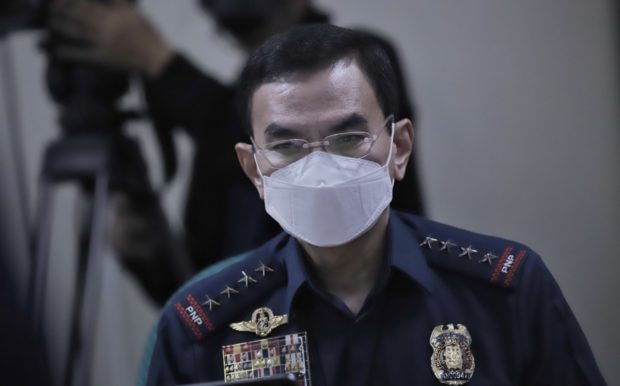
Newly-installed Philippine National Police (PNP) chief Lieutenant General Guillermo Eleazar attends a hybrid hearing conducted by the Senate Committee on Public Order and Dangerous Drugs. (Joseph Vidal/Senate PRIB)
MANILA, Philippines — Philippine National Police (PNP) chief Guillermo Eleazar on Wednesday said that strong evidence, and not simply guesswork, is needed to prove abuse of power by police officers before a case against them could be filed against them.
Eleazar said in an interview with ABS-CBN News Channel that the PNP does not tolerate misconduct among its ranks. However, legal procedure requires proof of lapses in a mission that ended in the death of a suspect.
“Hindi namin kinukunsinte ‘yan pero hindi pwedeng manghula,” he said. “Kung merong glaring evidence or merong evidence that the operative has committed lapses? Kung merong ganun talaga, e ‘di we have to file the case. Kaya kailangan natin ng ebidensya.”
(We don’t tolerate misconduct but we can’t guess. Is there’s glaring evidence that the operative has committed lapses? Then we have to file the case. That’s why we need evidence.)
He said that the PNP has not been short in filing homicide cases against erring policemen found to have invalidly killed suspects.
“Kung may mga cases na meron tayong ebidensya [If we have cases with evidence] that the that the police abused his power at may mga lapses in the conduct of the operation which resulted in the wounding or death of the suspect, fina-filean natin yan ng homicide [we file a homicide case],” he added.
The bottomline, Eleazar said, is that there should always be a presumption of regularity in the conduct of police operations.
“Kung halimbawa merong nanlaban during the encounter, e hindi naman lahat naman ng manyayari [na ganoon] is magpa-file tayo ng cases. Only if you have evidence na nakita natin na merong lapses… Hindi naman lahat ng merong namatay diyan pa-filean natin ng kaso ang pulis, ‘di yun ang practice natin, otherwise hindi tayo magiging efficient and effective on the conduct of those operations,” he said.
(If there’s someone who resisted arrest during the encounter, we don’t just file cases when things like that happen. Only if you have evidence na nakita natin na merong lapses…Not all incidents wherein a suspect dies warrant a filing of case, that’s not our practice, otherwise, the conduct of these operations will not be efficient and effective.)
“Nandoon yung ating presumption of regularity pero hindi ibig sabihin no’n e ligtas na yung pulis natin,” he added.
The PNP chief likewise asked for public support and cooperation in order to help the police clean up its ranks.
(There is a presumption of regularity but this does not mean that our police officers are off the hook.)
“Kaya we want transparency. The public should support and cooperate with us, otherwise mahihirapan din po kami na ayusin yung aming hanay kung wala naman po kaming ebidensya… Kasi tao namin ‘yan. Hindi namin kinukunsinte ‘yan pero hindi pwedeng manghula rin kami na sinasabing ganoon and just pa-filan namin ng kaso, mali naman po yun,” he added.
(That’s why we want transparency. The public should support and cooperate with us, otherwise, we would have a hard time cleaning up our ranks due to lack of evidence…Because that’s our people, while we do not tolerate misconduct, we can’t just guess and just file cases, that’s not right.)
Recently, the PNP gave the Department of Justice access to at least 61 cases where investigation showed that its personnel have been found to have administrative and criminal liability related to the “war on drugs” operation.
DOJ Secretary Menardo Guevarra said the 61 cases are the result of the investigation conducted by the PNP’s Internal Affairs Service “where clear liability was established.”